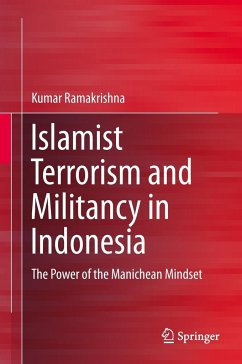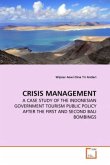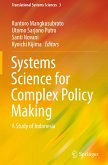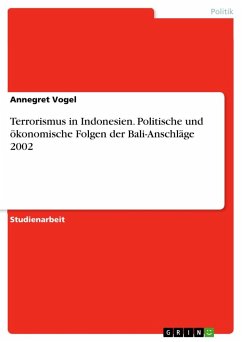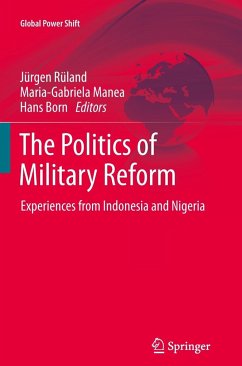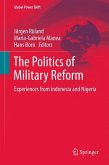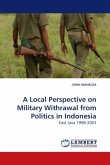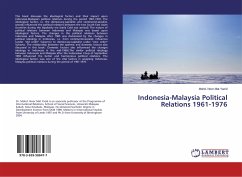- Gebundenes Buch
- Merkliste
- Auf die Merkliste
- Bewerten Bewerten
- Teilen
- Produkt teilen
- Produkterinnerung
- Produkterinnerung
Drawing upon insights from the natural and social sciences, this book puts forth a provocative new argument that the violent Islamist threat in Indonesia today derives its stubborn resilience from being in essence a complex, adaptive and self-organizing system - or what some specialists might even call a super-organism. The book challenges the popular assumption that ideology is the root cause that explains why Indonesian Islamists radicalize into violent extremism. In addition it addresses why despite years of intense security force pressure, seemingly disparate militant cells keep 'popping…mehr
Andere Kunden interessierten sich auch für
![CRISIS MANAGEMENT CRISIS MANAGEMENT]() Wipsar Aswi Dina Tri AndariCRISIS MANAGEMENT44,99 €
Wipsar Aswi Dina Tri AndariCRISIS MANAGEMENT44,99 €![Systems Science for Complex Policy Making Systems Science for Complex Policy Making]() Systems Science for Complex Policy Making37,99 €
Systems Science for Complex Policy Making37,99 €![Terrorismus in Indonesien. Politische und ökonomische Folgen der Bali-Anschläge 2002 Terrorismus in Indonesien. Politische und ökonomische Folgen der Bali-Anschläge 2002]() Annegret VogelTerrorismus in Indonesien. Politische und ökonomische Folgen der Bali-Anschläge 200215,95 €
Annegret VogelTerrorismus in Indonesien. Politische und ökonomische Folgen der Bali-Anschläge 200215,95 €![The Politics of Military Reform The Politics of Military Reform]() The Politics of Military Reform74,99 €
The Politics of Military Reform74,99 €![The Politics of Military Reform The Politics of Military Reform]() The Politics of Military Reform74,99 €
The Politics of Military Reform74,99 €![A Local Perspective on Military Withdrawal from Politics in Indonesia A Local Perspective on Military Withdrawal from Politics in Indonesia]() JONNI MAHROZAA Local Perspective on Military Withdrawal from Politics in Indonesia51,99 €
JONNI MAHROZAA Local Perspective on Military Withdrawal from Politics in Indonesia51,99 €![Indonesia-Malaysia Political Relations 1961-1976 Indonesia-Malaysia Political Relations 1961-1976]() Mohd. Noor Mat YazidIndonesia-Malaysia Political Relations 1961-197619,99 €
Mohd. Noor Mat YazidIndonesia-Malaysia Political Relations 1961-197619,99 €-
-
-
Drawing upon insights from the natural and social sciences, this book puts forth a provocative new argument that the violent Islamist threat in Indonesia today derives its stubborn resilience from being in essence a complex, adaptive and self-organizing system - or what some specialists might even call a super-organism. The book challenges the popular assumption that ideology is the root cause that explains why Indonesian Islamists radicalize into violent extremism. In addition it addresses why despite years of intense security force pressure, seemingly disparate militant cells keep 'popping up' like the proverbial hydra - and in the apparent absence of a centralized coordinating body, nevertheless appear to display an organic interconnectivity with one another. Going beyond standard ideological mantras the book argues that fresh inter-disciplinary thinking is needed to cope with the constantly mutating violent Islamist challenge in Indonesia, and puts forth a comprehensive strategy for doing so. It will be of interest to academics and students of terrorism, religion and violence in the Southeast Asian region.
Produktdetails
- Produktdetails
- Verlag: Springer / Springer Nature Singapore / Springer, Berlin
- Artikelnr. des Verlages: 978-981-287-193-0
- 2015
- Seitenzahl: 280
- Erscheinungstermin: 31. Oktober 2014
- Englisch
- Abmessung: 241mm x 160mm x 21mm
- Gewicht: 532g
- ISBN-13: 9789812871930
- ISBN-10: 9812871934
- Artikelnr.: 41202254
- Verlag: Springer / Springer Nature Singapore / Springer, Berlin
- Artikelnr. des Verlages: 978-981-287-193-0
- 2015
- Seitenzahl: 280
- Erscheinungstermin: 31. Oktober 2014
- Englisch
- Abmessung: 241mm x 160mm x 21mm
- Gewicht: 532g
- ISBN-13: 9789812871930
- ISBN-10: 9812871934
- Artikelnr.: 41202254
Kumar Ramakrishna is Associate Professor and Head of the Centre of Excellence for National Security at the S. Rajaratnam School of International Studies, Nanyang Technological University, Singapore. He has been a frequent speaker on counter-terrorism before local and international audiences, a regular media commentator on the issue and published in numerous internationally refereed journals. He has co-edited two well-received books on counter-terrorism, The New Terrorism: Anatomy, Trends and Counter-Strategies (2002) as well as After Bali: The Threat of Terrorism in Southeast Asia (2004). His first major book, Emergency Propaganda: The Winning of Malayan Hearts and Minds, 1948-1958, (2002) was described by The International History Review as ¿required reading for historians of Malaya, and for those whose task is to counter insurgents, guerrillas, and-terrorists¿. In May 2012, his most recent book, Radical Pathways: Understanding Muslim Radicalization in Indonesia (2009), was identified by Perspectives on Terrorism as one of the top 150 books on terrorism and counter-terrorism as well as ¿an important and insightful case study on the pathways to extremism and violent jihad in Indonesiä.
Acknowledgements.- Chapter 1: Is Ideology the 'Root' of Islamist Terrorism in Indonesia?.- 1.1: An Encounter with a Terrorist - And an Epiphany.- 1.2: The Overall Argument at a Glance.- 1.3: The Three Limitations of Extant Scholarship on Islamist Militancy in Indonesia.- 1.4: Research Note.- 1.5: The Plan of the Book.- References.- Part 1: The Human Nature Triad Unpacked - The Manichean Mindset, Embattled Religiosity and Violent Fundamentalism.- Chapter 2: The Origins of the 'Manichean Mindset'.- 2.1: Introduction.- 2.2: The Great Human Nature Debate.- 2.3: Evolutionary Psychology and our Ancestral Shadow.- 2.4: Darwin, Individual Selection and the Thorny Issue of Cooperation.- 2.5: The Rise of Human 'Groupishness'.- 2.6: Social Categorization, Group Selection and the Uncomfortable Logic of Between-Group Competition.- 2.7: Binary Oppositions, the Human Need for Control and the 'Group Tent'.- 2.8: The Manichean Mindset Deconstructed.- 2.9: Conclusion.- References.- Chapter 3: The Embattled Religiosity of Religious Fundamentalism.- 3.1: Introduction.- 3.2: The Religiosity Instinct and the Cultural Artefact of Religion.- 3.3: Religion as an Evolutionary By-Product, Part I: The Pattern-Seeking, Storytelling, Mythmaking Individual.- 3.4: Religion as an Evolutionary By-Product, Part II: The Hyper-Active Agency Detection Device.- 3.5: Religion as an Evolutionary Adaptation for the Group: Beyond Kin and Direct Reciprocity.- 3.6: Enter the Meme.- 3.7: The Manichean Mindset, Religious Fundamentalism and the Potential for Violence.- 3.8: Conclusion.- References.- Chapter 4: Six Steps Towards Violent Fundamentalism.- 4.1: Introduction.- 4.2: Violent Radicalization, Extremism or Fundamentalism: What's in a Name?.- 4.2.1: A New Synthesis: Cognitive Radicalization as Drastic Identity Simplification.- 4.2.2: Cognitive Radicalism and Cognitive Extremism.- 4.3: A Tight Counterculture.- 4.3.1: Understanding Culture.- 4.3.2: Culture's Evolutionary Rationale.- 4.3.3: 'Tight' Cultures.- 4.3.4: Relevant Dimensions of Culture.- 4.3.5: Tight Countercultures.- 4.4: An Enabling Ideology.- 4.5: The Protean Charismatic Group: Converging Perspectives.- 4.5.1: The Complexity Element of the Human Nature Triad.- 4.5.2: The Charismatic Group as Complex Adaptive System.- 4.6: Intragroup Psychic Dynamics.- 4.6.1: The Power of the Situation.- 4.6.2: The Impulse to Conform.- 4.6.3: De-individuation.- 4.6.4: Obedience to Authority.- 4.6.5: The Dispositionist Objection.- 4.6.6: The Echo Chamber Effect.- 4.6.7: Online Groups, Optimal Group Size, and Fuzzy Boundaries.- 4.7: The Power of Social Humiliation.- 4.8: The Enabling Environment.- 4.9: Conclusion.- References.- Part 2: The Human Nature Triad Applied - Violent Islamist Terrorism and Militancy in Indonesia: Origins, Evolution and the Counter-Ideological Response.- Chapter 5: The 'Glocalized' Origins of the Darul Islam Counterculture.- 5.1: Introduction.- 5.2: Islam: A Capsule History.- 5.2.1: The Socioecological Milieu.- 5.2.2: The Sufi Emergence.- 5.3: Islam in Southeast Asia.- 5.4: The Glocalization of Southeast Asian Islam and the Emergence of the Traditionalist-Modernist Binary Opposition.- 5.4.1: Glocalization Part I: The Traditionalists Emerge.- 5.4.2: Glocalization, Part II: Three Modernist Responses.- 5.4.2.1: The Wahhabi Tendency.- 5.4.2.2: The Salafi Tendency.- 5.4.2.3: The Islamist Tendency.- 5.5: The Emergence of Violent Islamism.- 5.5.1: Sayyid Qutb.- 5.5.2: 'Abd al-Salam Faraj.- 5.5.3: Abdullah Azzam.- 5.6: Conclusion.- References.- Chapter 6: The Darul Islam Charismatic Group and its Violent 'Mutations'.- 6.1: Introduction.- 6.2: SM Kartosoewirjo and the Origins of the Darul Islam Charismatic Group.- 6.3: Abu Bakar Ba'asyir and the Origins of the Jemaah Islamiyah Network.- 6.4: The Many Changing Faces of the Darul Islam Charismatic Group.- 6.5: The Turn to Violence.- 6.5.1: Three Recent Mutations of the Darul Islam Charismatic Group.- 6.5.1.1: Fahrul Tanjung Group in Bandung.- 6.5.1.2: Kumpulan Mujahidin Indonesia in Medan.- 6.5.1.3: Tim Ightiyalat in Klaten.- 6.6: Conclusion.- References.- Chapter 7: Muting Manichean Mindsets in Indonesia: A Counter-Ideological Response.- 7.1: Introduction.- 7.2: Terrorism and Islamist Violence in Indonesia: The Power of the Manichean Mindset.- 7.3: Muting Manichean Mindsets through a Counter-Ideological Response.- 7.3.1: Ideology: Not the Root, but the Center of Gravity.- 7.3.2: Exploiting Ideology to 'Steer' the DICG in Desired Directions.- 7.3.3: Steering the DICG via the Counter-Ideological Response Model.- 7.3.4: Sender.- 7.3.5: Message.- 7.3.6: Mechanism.- 7.3.7: Recipient.- 7.3.7.1: The Individual Militant.- 7.3.7.2: The Need for a Systematic Approach to Early Warning of the Individual Transition to Violent Cognitive Extremism.- 7.3.7.3: Cognitive Immunization of the Wider Community: The Challenges.- 7.3.7.4: The Problem with the Neo-Wahhabi Meme.- 7.3.7.5: The Need for Lived and Not Imaginary Islam - and Religion for that Matter.- 7.3.8: Context.- 7.3.8.1: Diminishing the Opportunity to be Violent.- 7.3.8.2: Ameliorating Social Humiliation.- 7.3.8.3: Rethinking Group Tent Status.- 7.4: Three Possible Futures.- 7.4.1: Collapse.- 7.4.2: Evolution.- 7.4.3: Containment.- 7.5: From the General to the Particular - And Back to the General. -References.- Index.
Acknowledgements.- Chapter 1: Is Ideology the 'Root' of Islamist Terrorism in Indonesia?.- 1.1: An Encounter with a Terrorist - And an Epiphany.- 1.2: The Overall Argument at a Glance.- 1.3: The Three Limitations of Extant Scholarship on Islamist Militancy in Indonesia.- 1.4: Research Note.- 1.5: The Plan of the Book.- References.- Part 1: The Human Nature Triad Unpacked - The Manichean Mindset, Embattled Religiosity and Violent Fundamentalism.- Chapter 2: The Origins of the 'Manichean Mindset'.- 2.1: Introduction.- 2.2: The Great Human Nature Debate.- 2.3: Evolutionary Psychology and our Ancestral Shadow.- 2.4: Darwin, Individual Selection and the Thorny Issue of Cooperation.- 2.5: The Rise of Human 'Groupishness'.- 2.6: Social Categorization, Group Selection and the Uncomfortable Logic of Between-Group Competition.- 2.7: Binary Oppositions, the Human Need for Control and the 'Group Tent'.- 2.8: The Manichean Mindset Deconstructed.- 2.9: Conclusion.- References.- Chapter 3: The Embattled Religiosity of Religious Fundamentalism.- 3.1: Introduction.- 3.2: The Religiosity Instinct and the Cultural Artefact of Religion.- 3.3: Religion as an Evolutionary By-Product, Part I: The Pattern-Seeking, Storytelling, Mythmaking Individual.- 3.4: Religion as an Evolutionary By-Product, Part II: The Hyper-Active Agency Detection Device.- 3.5: Religion as an Evolutionary Adaptation for the Group: Beyond Kin and Direct Reciprocity.- 3.6: Enter the Meme.- 3.7: The Manichean Mindset, Religious Fundamentalism and the Potential for Violence.- 3.8: Conclusion.- References.- Chapter 4: Six Steps Towards Violent Fundamentalism.- 4.1: Introduction.- 4.2: Violent Radicalization, Extremism or Fundamentalism: What's in a Name?.- 4.2.1: A New Synthesis: Cognitive Radicalization as Drastic Identity Simplification.- 4.2.2: Cognitive Radicalism and Cognitive Extremism.- 4.3: A Tight Counterculture.- 4.3.1: Understanding Culture.- 4.3.2: Culture's Evolutionary Rationale.- 4.3.3: 'Tight' Cultures.- 4.3.4: Relevant Dimensions of Culture.- 4.3.5: Tight Countercultures.- 4.4: An Enabling Ideology.- 4.5: The Protean Charismatic Group: Converging Perspectives.- 4.5.1: The Complexity Element of the Human Nature Triad.- 4.5.2: The Charismatic Group as Complex Adaptive System.- 4.6: Intragroup Psychic Dynamics.- 4.6.1: The Power of the Situation.- 4.6.2: The Impulse to Conform.- 4.6.3: De-individuation.- 4.6.4: Obedience to Authority.- 4.6.5: The Dispositionist Objection.- 4.6.6: The Echo Chamber Effect.- 4.6.7: Online Groups, Optimal Group Size, and Fuzzy Boundaries.- 4.7: The Power of Social Humiliation.- 4.8: The Enabling Environment.- 4.9: Conclusion.- References.- Part 2: The Human Nature Triad Applied - Violent Islamist Terrorism and Militancy in Indonesia: Origins, Evolution and the Counter-Ideological Response.- Chapter 5: The 'Glocalized' Origins of the Darul Islam Counterculture.- 5.1: Introduction.- 5.2: Islam: A Capsule History.- 5.2.1: The Socioecological Milieu.- 5.2.2: The Sufi Emergence.- 5.3: Islam in Southeast Asia.- 5.4: The Glocalization of Southeast Asian Islam and the Emergence of the Traditionalist-Modernist Binary Opposition.- 5.4.1: Glocalization Part I: The Traditionalists Emerge.- 5.4.2: Glocalization, Part II: Three Modernist Responses.- 5.4.2.1: The Wahhabi Tendency.- 5.4.2.2: The Salafi Tendency.- 5.4.2.3: The Islamist Tendency.- 5.5: The Emergence of Violent Islamism.- 5.5.1: Sayyid Qutb.- 5.5.2: 'Abd al-Salam Faraj.- 5.5.3: Abdullah Azzam.- 5.6: Conclusion.- References.- Chapter 6: The Darul Islam Charismatic Group and its Violent 'Mutations'.- 6.1: Introduction.- 6.2: SM Kartosoewirjo and the Origins of the Darul Islam Charismatic Group.- 6.3: Abu Bakar Ba'asyir and the Origins of the Jemaah Islamiyah Network.- 6.4: The Many Changing Faces of the Darul Islam Charismatic Group.- 6.5: The Turn to Violence.- 6.5.1: Three Recent Mutations of the Darul Islam Charismatic Group.- 6.5.1.1: Fahrul Tanjung Group in Bandung.- 6.5.1.2: Kumpulan Mujahidin Indonesia in Medan.- 6.5.1.3: Tim Ightiyalat in Klaten.- 6.6: Conclusion.- References.- Chapter 7: Muting Manichean Mindsets in Indonesia: A Counter-Ideological Response.- 7.1: Introduction.- 7.2: Terrorism and Islamist Violence in Indonesia: The Power of the Manichean Mindset.- 7.3: Muting Manichean Mindsets through a Counter-Ideological Response.- 7.3.1: Ideology: Not the Root, but the Center of Gravity.- 7.3.2: Exploiting Ideology to 'Steer' the DICG in Desired Directions.- 7.3.3: Steering the DICG via the Counter-Ideological Response Model.- 7.3.4: Sender.- 7.3.5: Message.- 7.3.6: Mechanism.- 7.3.7: Recipient.- 7.3.7.1: The Individual Militant.- 7.3.7.2: The Need for a Systematic Approach to Early Warning of the Individual Transition to Violent Cognitive Extremism.- 7.3.7.3: Cognitive Immunization of the Wider Community: The Challenges.- 7.3.7.4: The Problem with the Neo-Wahhabi Meme.- 7.3.7.5: The Need for Lived and Not Imaginary Islam - and Religion for that Matter.- 7.3.8: Context.- 7.3.8.1: Diminishing the Opportunity to be Violent.- 7.3.8.2: Ameliorating Social Humiliation.- 7.3.8.3: Rethinking Group Tent Status.- 7.4: Three Possible Futures.- 7.4.1: Collapse.- 7.4.2: Evolution.- 7.4.3: Containment.- 7.5: From the General to the Particular - And Back to the General. -References.- Index.

